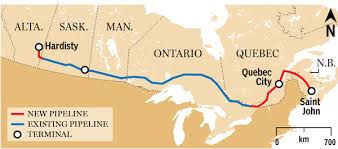Energy East – the new pipeline project from Alberta to New Brunswick announced last week – was awash with more superlatives than a Bay of Fundy lobster dinner. “Nation-building,” said Alberta Premier Alison Redford. “Historic,” stated TransCanada Corp. CEO Russ Girling. “A game changer,” claimed New Brunswick Premier David Alward.
Each is right, but in a way that none of them actually gave voice to. It is giving rise to a new language, and a new dynamic of federalism may be appearing that changes old views and challenges sturdy myths.
With pipelines all the environmental rage – literally, it seems – the plan for a pan-Canadian pipeline to transport oil-sands crude across the country to Canada’s largest refinery is big news.
It is churlish but correct to note that this project emerged from the woes afflicting TransCanada’s proposed Keystone XL pipeline to the United States. What was barely contemplated a year ago in Calgary now appears to be the best pipeline bet in town. But from adversity comes opportunity, and Energy East is the result.
That same notion, adversity to opportunity, should cause many Canadians, Albertans in particular, to reflect on how they perceive federalism and revenue-sharing. It should cause ardent centralists to reconsider the role of provinces in forging a stronger economic union. And it brings a new player into the Ottawa-Alberta climate conversation.
Shared interest and common cause among two diverse provinces, western and eastern, richer and poorer, means there is now a powerful counterargument to claims of confiscatory revenue sharing. Equalization is the bête noir of western “firewallers” who believe provincial wealth from natural resources should not be transferred through federal mechanisms to other provinces. But now, wealth generation in Alberta will be aided and abetted by New Brunswick. Without access to New Brunswick’s refining and port facilities, significant oil-sands crude would remain inaccessible to markets. Economic integration and shared provincial dependency underline the vapidity of those traditional anti-equalization arguments.
Recognition of that by Mr. Alward and Ms. Redford helped smooth the way for Energy East. In the absence of active federal engagement on collective matters of national interest, two provinces defined the national interest in a way that is, for now, commanding pan-Canadian support.
Pipelines have become focal points – chokepoints, really – for climate-change activists. That same activism will now be directed at Energy East and New Brunswick. A huge catalyst to this opposition is the absence of effective climate policies. New Brunswick’s policies will now come under more scrutiny and the province will have to up its game. But, importantly, it now has a stake in how Ottawa and Alberta work out their policies. It needs these to be real and effective to ensure that Energy East proceeds apace. Interdependence on climate policy is growing to match interdependence on energy policy.
Put directly: Alberta needs New Brunswick more today than it did yesterday. Equalization will be harder to portray as a revenue grab; there is a shared economic and political dependency that cannot be ignored. Provinces are forging their own definition of economic union and the national interest and making it stick. And one of Canada’s smallest provinces is influencing pan-Canadian energy policy, with climate policy possibly to come.
These dynamics augur well for Canada. Perhaps those superlatives were correct after all.
David McLaughlin is a former deputy minister of intergovernmental affairs and former chief of staff to the premier of New Brunswick.
With Energy East, the provinces define national interest
David McLaughlin



























Laissez un commentaire Votre adresse courriel ne sera pas publiée.
Veuillez vous connecter afin de laisser un commentaire.
Aucun commentaire trouvé